使用json-server实现增删改查
起步
一个在前端本地运行,可以存储json数据的server。我们在前端开发时,可以模拟服务端接口数据,在本地搭建一个JSON服务,自己产生测试数据。
- 使用npm全局安装json-server :
npm install -g json-server - 可以通过查看版本号,来测试是否安装成功:
json-server -v - 创建json数据——db.json
在任意一个文件夹下(此处假设我创建了一个server文件夹),进入到该文件夹里面,执行代码
json-server --watch db.json
- 此时文件夹下多出一个db.json文件
分别点击/posts /comments /profile /db链接,我们可以看到访问不同地址时不同的json数据。其中 /db返回的是整个json文件的数据。

修改端口号
json-server 默认是 3000 端口,我们也可以自己指定端口,指令如下:
json-server --watch db.json --port 3004
如果不想每次用这么长的指令,可以在db.json同级文件夹新建一个package.json,在script配置添加运行命令:
{
"scripts": {
"mock": "json-server db.json --port 3004"
}
}
运行的时候, 直接在当前文件夹下执行 npm run mock
操作数据
json-server 支持 restful 风格的api,可以通过不同的请求方式,对数据进行增删改查等不同的操作。
先修改db.json文件:
{
"users": [
{
"id": 1,
"name": "liaoyi",
"phone": "13246566776",
"age": 22,
"classId": "1002"
},
{
"name": "林更新",
"age": "44",
"id": 4,
"classId": "1003"
},
{
"name": "李响",
"phone": "18779756778",
"age": "26",
"id": 5,
"classId": "1003"
},
{
"name": "陈温柔",
"phone": "18779756000",
"age": "22",
"id": 6,
"sex": "0",
"classId": "1004"
},
{
"name": "夏琪",
"phone": "13246579999",
"age": "22",
"id": 7,
"classId": "1004"
}
],
"class": [
{
"id": "1",
"title": "前端",
"staff": [
"1002",
"1004"
]
},
{
"id": "2",
"title": "后端",
"staff": [
"1003"
]
}
],
"fruits": [
{
"id": 1,
"name": "苹果",
"price": 1.28
},
{
"id": 2,
"name": "橘子",
"price": 3.88
},
{
"id": 3,
"name": "宁夏西瓜",
"price": 1.98
},
{
"id": 4,
"name": "麒麟西瓜",
"price": 3.98
},
{
"id": 5,
"name": "红蛇果",
"price": 2.5
},
{
"id": 6,
"name": "黑皮西瓜",
"price": 0.98
},
{
"id": 7,
"name": "红心火龙果",
"price": 2.69
},
{
"id": 8,
"name": "国产火龙果",
"price": 1.69
},
{
"id": 9,
"name": "海南荔枝",
"price": 9.9
},
{
"id": 10,
"name": "陕西冬枣",
"price": 5.39
},
{
"id": 11,
"name": "软籽石榴",
"price": 2.39
},
{
"id": 12,
"name": "蜜橘",
"price": 1.99
},
{
"id": 13,
"name": "海南香蕉",
"price": 1.45
}
],
"person": [
{
"name": {
"firstname": "liao",
"lastname": "yi"
},
"pwd": "qwerst54"
},
{
"name": {
"firstname": "wang",
"lastname": "wu"
},
"pwd": "adasff11"
}
]
}
get 获取数据
浏览器可以直接访问GET请求,我们可以直接在浏览器访问就能看到返回的json数据。
获取所有用户数据(对象数组): [http://localhost:3004/users](http://localhost:3004/users)
获取所有水果数据:http://localhost:3004/fruits
获取数据
根据 id 获取 users 数据:http://localhost:3004/users/1
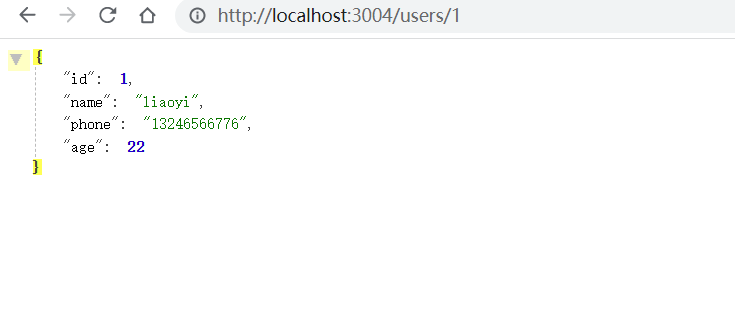
上面的请求写法还可以通过get请求的query参数通过?方式来写:
http://localhost:3004/users?id=1
以此类推,我们可以传入不同的条件:
// 查找名字为 'liaoyi' 的用户
http://localhost:3004/users?name=liaoyi
多个条件
也可以指定多个条件,用&符号连接:
http://localhost:3004/fruits?name=橘子&price=3.88
甚至还可以使用对象取属性值 obj.key 的方式:
http://localhost:3004/person?name.firstname=liao
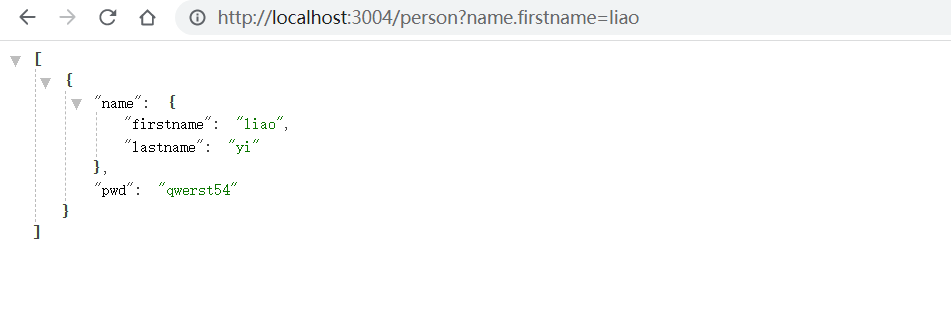
分页
分页采用
_page来设置页码,_limit来控制每页显示条数。如果没有指定 _limit ,默认每页显示10条。
我们可以依次输入地址查看下面接口中返回不同的结果:
http://localhost:3004/fruits?_page=1&_limit=5
http://localhost:3004/fruits?_page=1&_limit=10
http://localhost:3004/fruits?_page=2&_limit=5
排序
排序采用
_sort来指定要排序的字段,_order来指定排序是正排序还是逆排序(asc | desc ,默认是asc)。
http://localhost:3004/fruits?_sort=price
http://localhost:3004/fruits?_sort=price&_order=desc
获取局部数据
采用
_start来指定开始位置,_end来指定结束位置、或者是用_limit来指定从开始位置起往后取几个数据。和 Array.slice() 方法类似。
# 使用 _end
http://localhost:3004/fruits?_start=2&_end=4
# 使用 _limit
http://localhost:3004/fruits?_start=2&_limit=4
获取符合某个范围的数据
- 使用
_gte和_lte来设置一个取值范围 :
http://localhost:3004/fruits?id_gte=4&id_lte=6
- 使用
_ne来获取不包含某个值的数据
http://localhost:3004/fruits?id_ne=1&id_ne=10
- 采用
_like来设置匹配某个字符串(或正则表达式)
http://localhost:3004/fruits?name_like=果
搜索功能
采用q来设置搜索内容:
http://localhost:3004/fruits?q=瓜
除get请求外,其他请求方式需要我们通过 api 调试工具或者代码的方式来使用。
post 新增数据
<template>
<el-button @click="add"> 发送请求 </el-button>
</template>
<script setup>
import axios from 'axios'
const url = 'http://localhost:3004/users'
const add = async () => {
const data = {
name: '林更新',
phone: '18779756000',
age: '22'
}
const { data: res } = await axios({ method: 'post', url, data })
console.log('res', res)
}
</script>
当然你也可以使用 api 调试工具来测试接口,这里我使用 apifox:
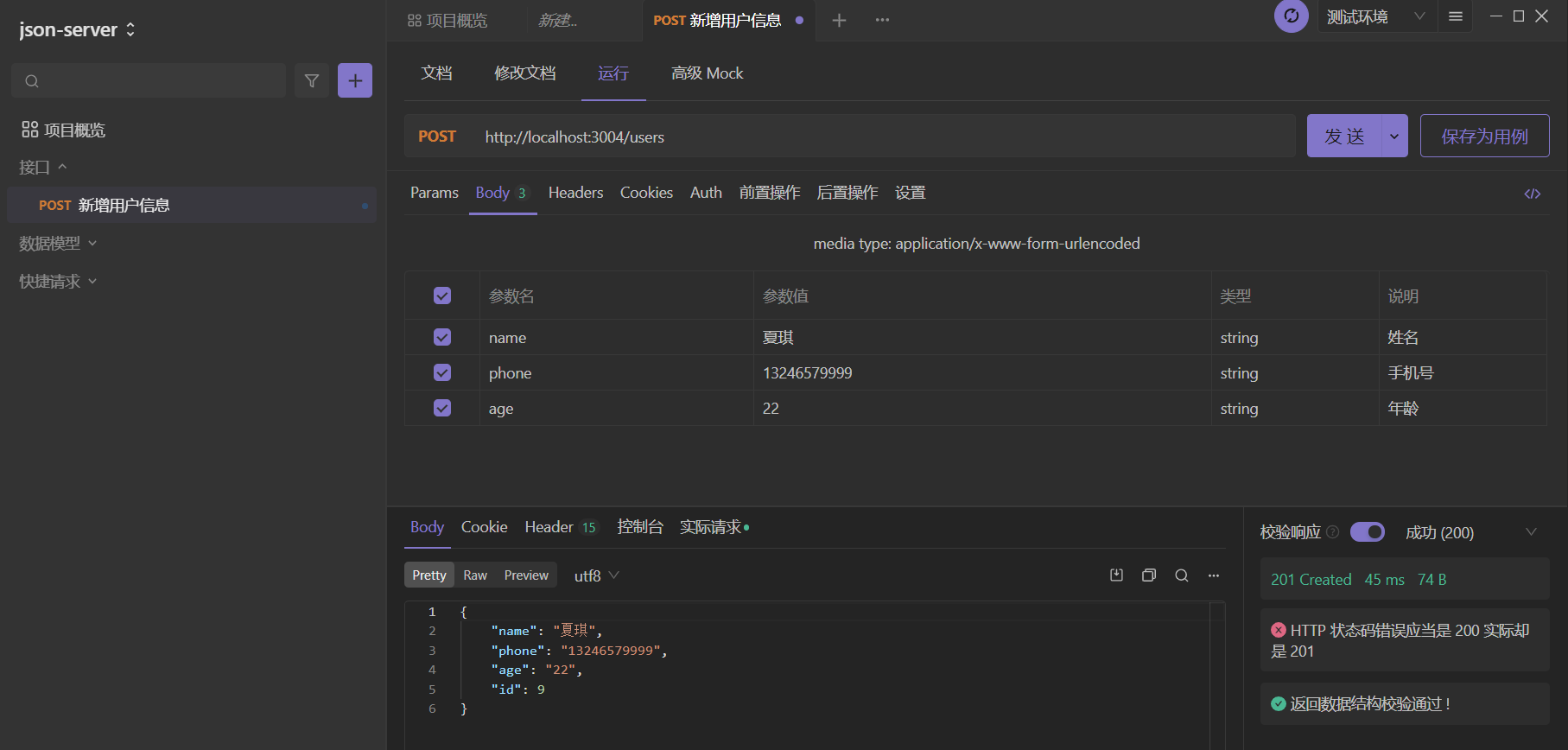
delete 删除数据
通过id删除users里id为3的用户数据:
<template>
<el-button @click="deleteUser"> 删除用户 </el-button>
</template>
<script setup>
import axios from 'axios'
const userId = 3
const url = `http://localhost:3004/users/${userId}`
const deleteUser = async () => {
const res = await axios({ method: 'delete', url })
console.log('res', res)
}
</script>
put 修改数据 (替换)
PUT方法会更新整个资源对象,前端没有给出的字段,会自动清空。
<template>
<el-button @click="reviseUser"> put 修改用户 </el-button>
</template>
<script setup>
import axios from 'axios'
const userId = 4
const url = `http://localhost:3004/users/${userId}`
const reviseUser = async () => {
const data = {
"name": "林更新",
"age": "44"
}
const res = await axios({ method: 'put', url, data })
console.log('res', res)
}
</script>
但是使用put修改后会有一个问题,只会保留提交的字段,没有提交的字段在json中将会被删除,如下图,我们更改了id为4的用户,只提交了name和age,原来的json文件中,phone字段被删除了:
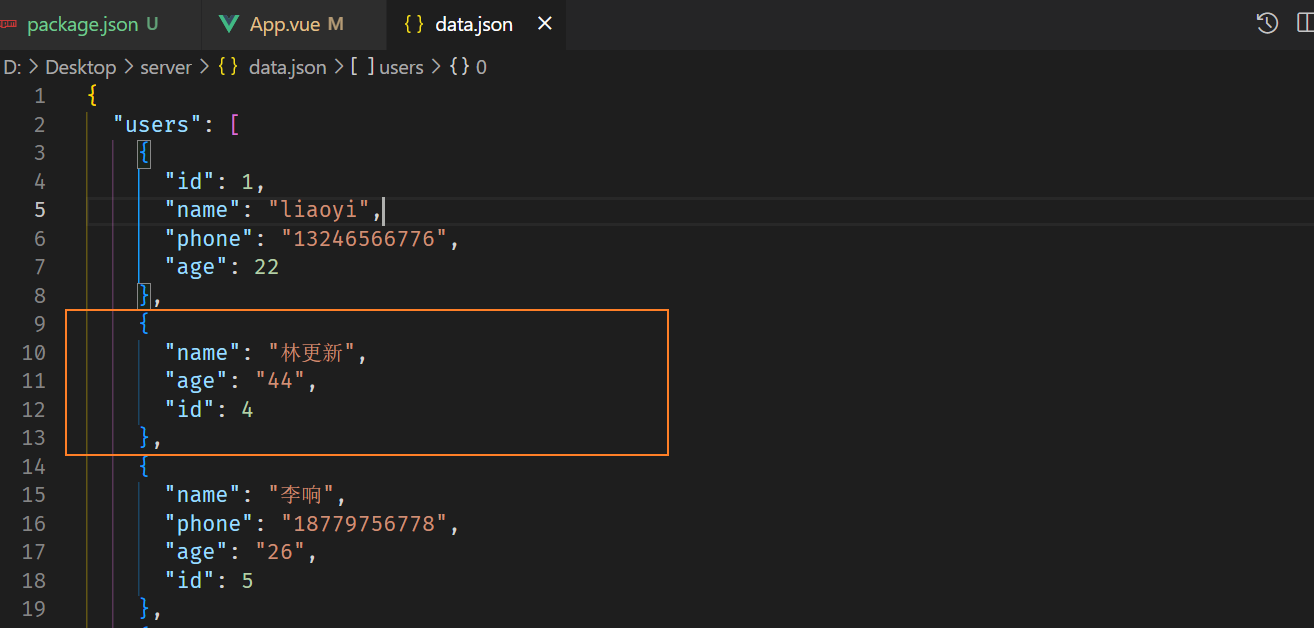
这时候我们就要用到 patch 请求了:
patch 修改数据
只修改请求的字段,没有请求的字段将会被保留。
<template>
<el-button @click="reviseUser"> patch修改用户 </el-button>
</template>
<script setup>
import axios from 'axios'
const userId = 8
const url = `http://localhost:3004/users/${userId}`
const reviseUser = async () => {
const data = {
name: "陈温柔",
age: "22",
sex: "0"
}
const res = await axios({ method: 'patch', url, data })
console.log('res', res)
}
</script>
关联检索
通过 _expand 方式检索关联父级数据:
这里的 _expand=class 匹配的其实是为了和 users 对象中的 classId做关联,但是已经存在classId字段了,我们需要写出 class, 比如检索的是 repaId 我们旧写成 repa:
# class 是一个别名
http://localhost:3004/users?_expand=class
得到的数据:
[
{
"id": 1,
"name": "liaoyi",
"phone": "13246566776",
"age": 22,
"classId": "1",
"class": {
"id": "1",
"title": "前端",
"staff": [
"7",
"6",
"1"
]
}
},
{
"name": "林更新",
"age": "44",
"id": 4,
"classId": "2",
"class": {
"id": "2",
"title": "后端",
"staff": [
"4",
"5"
]
}
},
{
"name": "李响",
"phone": "18779756778",
"age": "26",
"id": 5,
"classId": "2",
"class": {
"id": "2",
"title": "后端",
"staff": [
"4",
"5"
]
}
},
{
"name": "陈温柔",
"phone": "18779756000",
"age": "22",
"id": 6,
"sex": "0",
"classId": "1",
"class": {
"id": "1",
"title": "前端",
"staff": [
"7",
"6",
"1"
]
}
},
{
"name": "夏琪",
"phone": "13246579999",
"age": "22",
"id": 7,
"classId": "1",
"class": {
"id": "1",
"title": "前端",
"staff": [
"7",
"6",
"1"
]
}
}
]
通过 _embed 方式检索关联子级数据:
注意: 这里_embed 需要和子表名 (要关联的子集属性名) 匹配。
http://localhost:3004/classes?_embed=users
得到的数据:
[
{
"id": "1",
"title": "前端",
"staffIds": [
"1001",
"1004",
"1005"
],
"users": [
{
"id": "1001",
"name": "liaoyi",
"phone": "13246566776",
"age": 22,
"classId": "1"
},
{
"name": "陈温柔",
"phone": "18779756000",
"age": "22",
"id": "1004",
"sex": "0",
"classId": "1"
},
{
"name": "夏琪",
"phone": "13246579999",
"age": "22",
"id": "1005",
"classId": "1"
}
]
},
{
"id": "2",
"title": "后端",
"staffIds": [
"1002",
"1003"
],
"users": [
{
"name": "林更新",
"age": "44",
"id": "1002",
"classId": "2"
},
{
"name": "李响",
"phone": "18779756778",
"age": "26",
"id": "1003",
"classId": "2"
}
]
}
]

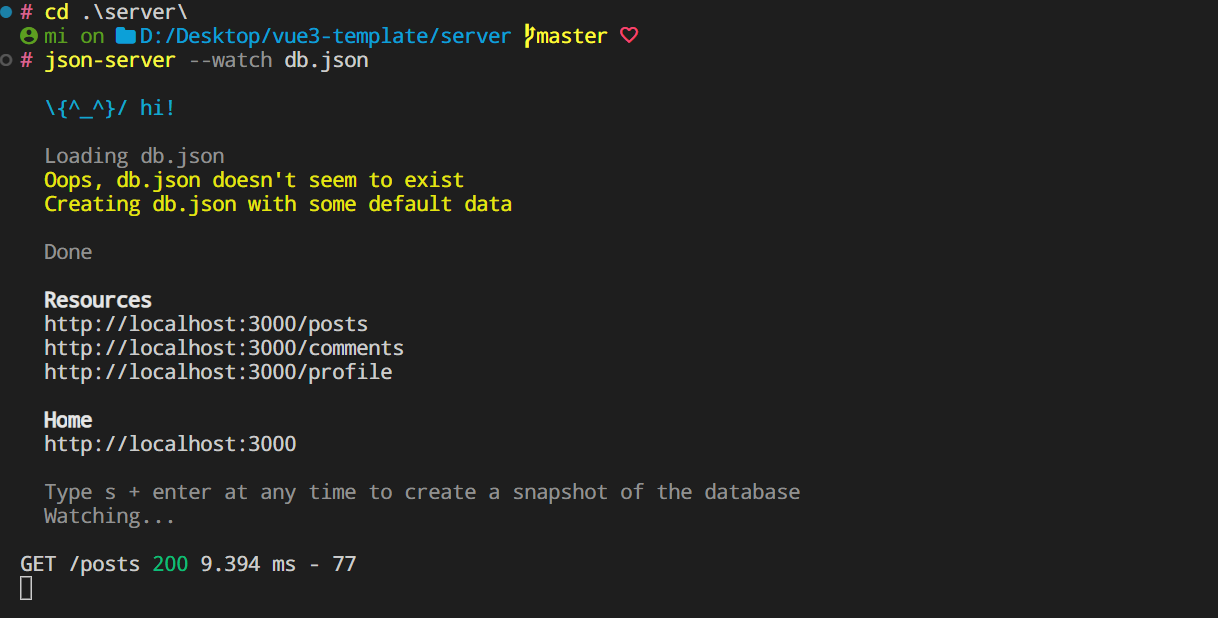
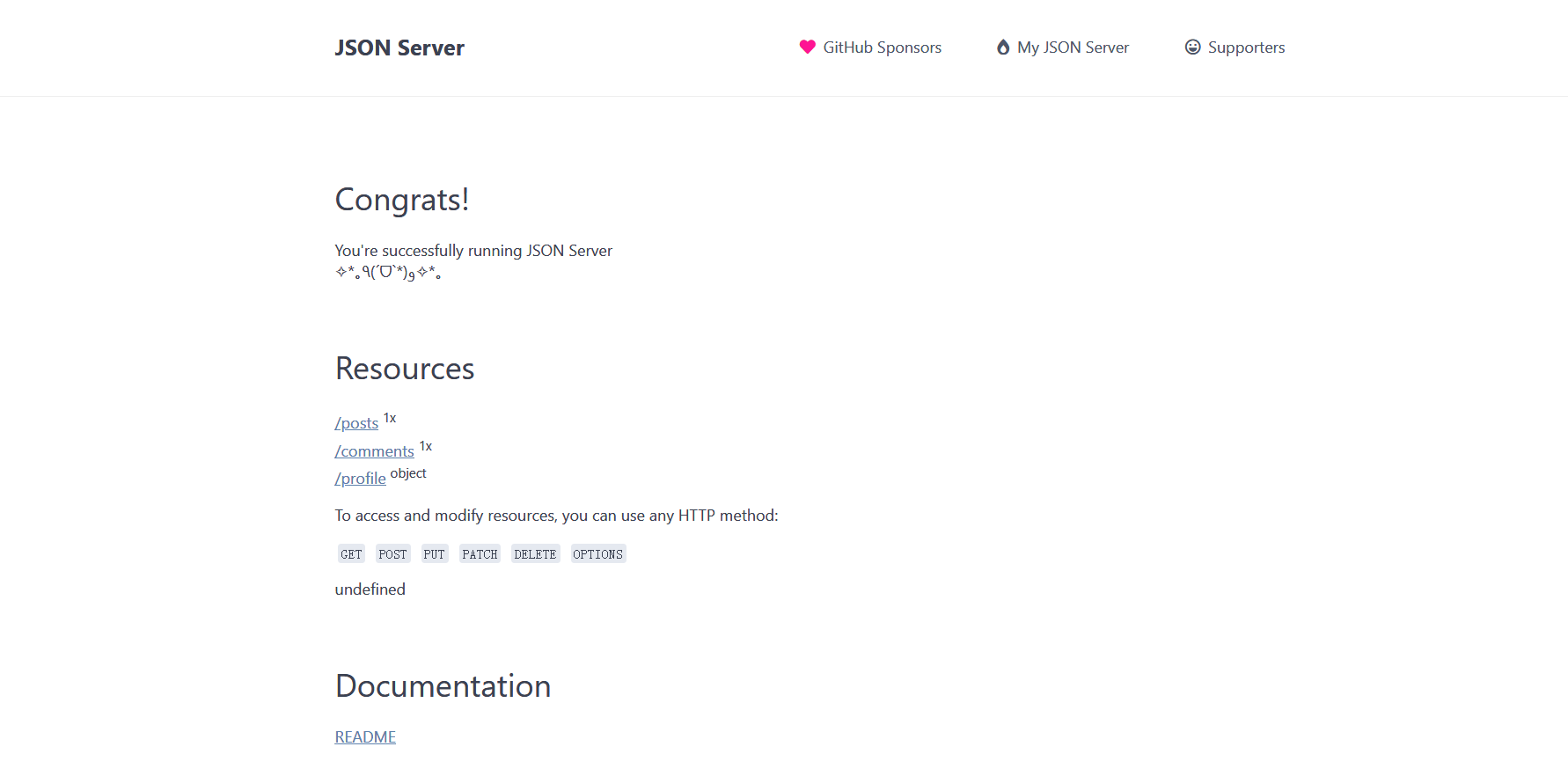

 浙公网安备 33010602011771号
浙公网安备 33010602011771号